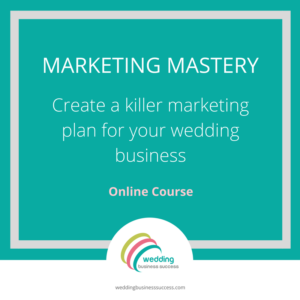How much should you spend on Marketing?
It’s the question that’s asked so often. And one that’s very hard to answer.
For any kind of business to succeed, you have to let people know you exist. Which means marketing.
Marketing should be regarded as an investment rather than a cost. In the long term the money you spend should be returned (with interest) by the sales it generates.
But, of course, the key here is “long term” – and in the wedding industry that can be a very long time. Brides you meet at a wedding fair may not be getting married for two or more years.
There’s no set formula
You may see some articles that suggest you spend 5%, 7% or 10% of your overall turnover on marketing. But every business and industry is different.
When you are just starting out and your sales are zero it’s a useless calculation.
Growing businesses will need to spend more than established business.
And the wedding industry is a particular challenge because there is little scope for repeat business from previous customers. So you need to be meeting new couples every year.
What do you really need?
A good place to start with your marketing budget is to work out what activities you want to do and how much they will cost.
Think about what’s really important and what is going to get you enquiries from those couples who desperately want your product or service.
Fancy brochures may look lovely but how effective will they be in bringing extra sales?
Wedding fairs may seem expensive but at a well organised one you could be meeting plenty of potential customers.
Budget time as well as money
These days there are many ways to market your business without spending much actual cash. Social Media, Blogging, Networking.
However, it’s important to recognise that time is a valuable commodity too so you need to spend it just as carefully as you would money.
Don’t choose a particular marketing activity just because it’s free. If you think the best place to meet your future customers is wedding fairs, then you should find the money to invest in wedding fairs.
And it’s not a good idea to try to save a few pounds by doing everything yourself – especially if you don’t have the skills.
I see this all the time with people trying to create their own websites. They spend hours trying to work out how to get things in the right place and getting more and more frustrated. The usual result is that they end up having to get a professional in to sort out the mess anyway.
If you do want to learn to do something yourself then invest in proper training.
Think long term too
Some marketing activities take longer to achieve results.
But often these are the things that eventually will bring you the best rewards – sustainable, cost effective sales. Things like search optimisation and networking. Don’t put these off – aim to have a mix of both short and long term activities in your marketing plan.
Putting together your marketing budget
OK, it’s now time to bring all this together and set your marketing budget for the next year.
Make a list of all the things you want to do and then go through them ruthlessly until you have a focused list.
Now work out how much each will cost over the next 12 months to get your marketing budget for the year.
Does this seem realistic and affordable? You may need to compromise or make some adjustments based on your actual circumstances, but this gives you a good starting point.
Remember to monitor your spending as you go and record the sales that each activity generates. Then you can adjust your spending each year as your business grows and you learn what works for you.
Want to make sure you only spend your time and money on the RIGHT things? The Marketing Mastery online course takes you through all the steps to creating an effective marketing plan for your business.



